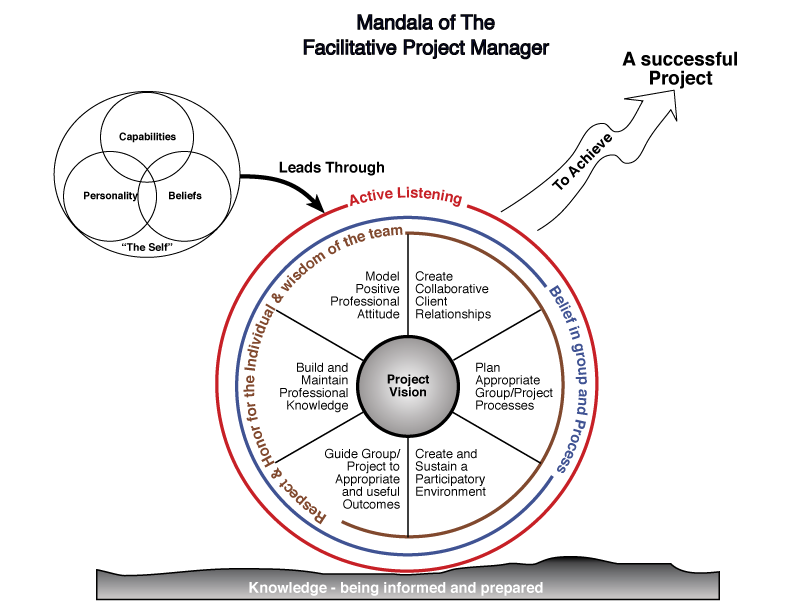October 2007 - The FoCuSeD™ Facilitator eNewsletter

Should a Project Manager BE a Facilitator? | Gary Rush Facilitation
Coming from an IT background, as a Business Analyst, Programmer, and Project Manager, I learned that Project Managers managed content. Therefore, a Project Manager could not be a Facilitator – it violated neutrality. But, with the growth of Project Management, thanks to the Project Management Institute (PMI), and the growth of Project Management Offices (PMOs), that has changed my view.
PMI publishes a handbook for Project Managers – the Project Management Body of Knowledge (PMBoK). It describes project management independently of what type of project is being managed and independent of what type of business the project is for. In other words, project management is project management – whether it’s for IT, construction, marketing, or whatever.
I watched a company implement a PMO in which the Project Managers managed all types of projects, from IT to construction to facility design. These Project Managers were all trained as Facilitators. So, why can’t a Project Manager BE a Facilitator?
Facilitator
The Facilitator defines a process for a group of people that enables them to accomplish a task. The Facilitator then guides the group through the process to accomplish their task. Effective Facilitators are able to guide the group through its stages of development managing the emotional growth. All Facilitators must be content neutral – that is, they must not engage in or bring in information or opinions regarding the subject matter or business being discussed. They do however, through preparation, provide effective processes for a group to follow. The effective processes brought by the Facilitator focus the content knowledge brought by the group, enabling effective decision-making. Facilitators are process experts.
Project Manager
According to the PMBoK, “Project management is accomplished through the application and integration of the project management processes of initiating, planning, executing, monitoring and controlling, and closing. The Project Manager is the person responsible for accomplishing the project objectives. Managing a project includes:
- Identifying requirements.
- Establishing clear and achievable objectives.
- Balancing competing demands for quality, scope, time, and cost.
- Adapting the specification, plans, and approaches to the different concerns and expectations of stakeholders.”
Looking at the definition from the PMBoK above, the Project Manager is an expert on the process of Project Management. It doesn’t state that they are content experts.
Rethinking the Role
Given the role-descriptions above, we need to rethink the traditional view of the role of the Project Manager. Project Managers are process experts – expert in the project management process. Facilitators are process experts – experts in the Facilitation process. Both are more knowledgeable about process than about content. How many Project Managers know as much about a particular business as their clients do? If project management is project management regardless of the type of project, why do we ask Project Managers to know about content? Project Managers are only successful if they are able to form their teams and get them to accomplish their task – just as a Facilitator.
Project Managers in the 21st Century
Since companies first started using Information Technology, they insisted that Project Managers know business content. That isn’t true anymore. Project Managers should remain content neutral. By remaining neutral, they:
- Find the appropriate clients who know the business content – this provides more effective information.
- Focus on process and don’t influence content directions – this provides higher quality outcome.
Project Managers should facilitate the development of project plans, the identification of requirements, the establishment of objectives, and every other aspect of a project. In the implementation of the PMO mentioned earlier, all Project Managers were trained as Facilitators. Why not? Properly facilitated projects using the proper process produces better results that have the support of all stakeholders and have the greatest chance of success.
Benefits
By training Project Managers to be Facilitators and define their role as a Project Manager/ Facilitator, we gain the following benefits:
- Project Managers learn skills to bring groups together to develop consensus and support.
- Project Managers focus on the right processes to:
- Identify requirements of the client.
- Establish clear and achievable objectives for the project.
- Balance competing demands for quality, scope, time, and cost by involving the appropriate parties.
- Inclusively adapt the specification, plans, and approaches to the different concerns and expectations of stakeholders.
Conclusion
A Project Manager should BE a Facilitator. ![]()
“Be a Leader – Great Leaders are Facilitators.”

